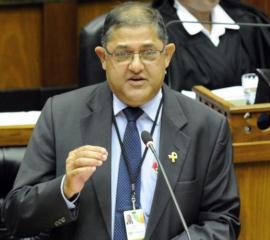
As South Africa transitions towards a low carbon economy, Deputy Minister of Forestry, Fisheries and the Environment, Narend Singh, says the benefits of energy renewable projects should be shared equitably with communities.
Addressing the Municipal Just Energy Transition Conference at Gallagher Estate in Midrand, the Deputy Minister emphasised the importance of addressing potential job losses in the coal sector.
South Africa’s plans for the just energy transition will focus on the transition of the energy sector, as it navigates the shift away from coal towards cleaner sources of energy.
“It is essential that we approach this transition with humanity, providing support, training, and creating new opportunities within the renewable energy sector. A holistic approach is required, one that embraces clear and comprehensive national renewable energy policies sets defined targets and provides a roadmap for the transition.
“Community participation and ownership in renewable energy projects must be a cornerstone of this policy, ensuring that the benefits of this transition are shared equitably,” Singh said on Monday.
While necessary, he said the just energy transition does come with its set of challenges.
“Acknowledging our current economic growth's stagnation, the reliance on coal for energy, and the coal industry's role as a significant employment sector, we understand the complexities involved.
“Moreover, the challenge of making renewable energy technologies affordable and accessible cannot be overlooked. We need innovative financing mechanisms to ensure that clean energy solutions are within reach for all South Africans, especially those in low-income communities.
“As we chart our course forward, it is clear that no single solution can address the multifaceted challenges we face,” the Deputy Minister said.
He said for South Africa to truly succeed, it needs more than just policies and roadmaps.
“…We need action and commitment from every sector of our society. From all spheres of government to the private sector, from civil society to every citizen, we must unite in our efforts towards a sustainable future. Now is the time for us to harness the incredible potential of renewable energy, to innovate, to build, and to grow together.
“Therefore, our call to action as a responsible, interdependent, and interrelated government is not just to listen but to participate actively in this transition. Let us collaborate, innovate, and implement the solutions that will power our nation forward.
“Let us build a future that aligns with our environmental, economic, and social imperatives. A future where sustainable energy drives our progress, where no one is left behind, and where we stand as a beacon of hope and resilience in the face of global challenges,” Singh said.
He stressed that local government is at the coal face of the country’s efforts, as this is where policy legislation and regulation turn into action.
“We must be focusing on a back-to-basics approach, getting the basics right with respect to our daily deliverables. More than half of the battle will be won if every local sphere of government gets the basics right. Innovation and consistently good service delivery are what will carry the day,” the Deputy Minister said.
He said electricity is the backbone of progress, an enabler that unlocks industrial growth, drives the economy, and promotes inclusivity.
“Yet, the sustainability of our progress hinges on our ability to shift towards clean energy. The spectres of poverty, inequality and unemployment cannot be exorcised without robust GDP [gross domestic product] growth, which in turn demands a stable and sufficient energy supply.
“However, our journey is compounded by the environmental cost of our past reliance on coal. This has left us with a legacy of environmental degradation and health issues, making our commitment to transitioning to renewable energy sources crucial for our environment and the well-being of our communities,” Singh said. - SAnews.gov.za


